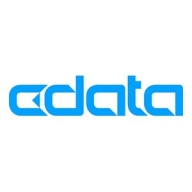

MongoDB Atlas and CData AWS Glue Data Connectors compete in cloud data solutions, each having distinct advantages. MongoDB Atlas has the upper hand in features, enhanced functionality, and flexibility, whereas CData AWS Glue Data Connectors may appeal in specific use cases due to unique integration capabilities.
Features: MongoDB Atlas offers automated scaling, robust security, and comprehensive service integrations. CData AWS Glue Data Connectors provides extensive connectivity to various data sources and seamless AWS integration. MongoDB Atlas presents a broader functionality scope, while CData AWS Glue Data Connectors emphasizes connectivity strengths.
Ease of Deployment and Customer Service: MongoDB Atlas features straightforward deployment with strong monitoring tools and highly rated support services. CData AWS Glue Data Connectors is intuitive with extensive documentation but may require AWS expertise for optimal setup. MongoDB Atlas provides a smoother customer experience.
Pricing and ROI: MongoDB Atlas offers a straightforward pricing model leading to better ROI through scalability and resource management. CData AWS Glue Data Connectors may have higher setup costs, but ROI can be favorable if its integration capabilities are fully utilized. The pricing structure of MongoDB Atlas is often more predictable, but CData AWS Glue Data Connectors can be worth the investment for extensive data connectivity.

CData AWS Glue Data Connectors offer efficient connectivity to a wide range of data sources, facilitating seamless integration for data processing and analytics within AWS Glue environments.
Designed for data integration tasks, CData AWS Glue Data Connectors streamline access to critical data by providing stable connections to diverse databases and applications. They support businesses in managing and translating complex data flows into cohesive insights, making integration flexible and customizable to meet evolving technology landscapes. These connectors enhance the automation of data pipelines in big data and business intelligence projects.
What are the key features of CData AWS Glue Data Connectors?In industries like finance and healthcare, CData AWS Glue Data Connectors are implemented to integrate data from disparate systems, enabling seamless operations and better compliance reporting. In retail, they support analytics by merging sales and inventory data for real-time insights, transforming how businesses leverage information for strategic advantages.
MongoDB Atlas stands out with its schemaless architecture, scalability, and user-friendly design. It simplifies data management with automatic scaling and seamless integration, providing dynamic solutions for diverse industries.
MongoDB Atlas offers a cloud-based platform valued for its seamless integration capabilities and high-performance data visualization. It features advanced security options such as encryption and role-based access control alongside flexible data storage and efficient indexing. Users benefit from its robust API support and the ability to manage the platform without an extensive setup process. Feedback suggests improvements are needed in usability, query performance, security options, and third-party tool compatibility. While pricing and support services could be more economical, there is a demand for enhanced real-time monitoring and comprehensive dashboards, as well as advanced containerization and scalability options supporting complex database structures.
What are the key features of MongoDB Atlas?
What benefits should you consider in a solution like MongoDB Atlas?
In healthcare and finance, MongoDB Atlas manages payment transactions and facilitates real-time analytics, powering SaaS solutions and storing large volumes of user data. It enhances scalability, performance, and security for cloud hosting, IoT integrations, and Node.js environments, widely favored for its flexibility and capability to support microservices.
We monitor all AWS Marketplace reviews to prevent fraudulent reviews and keep review quality high. We do not post reviews by company employees or direct competitors. We validate each review for authenticity via cross-reference with LinkedIn, and personal follow-up with the reviewer when necessary.